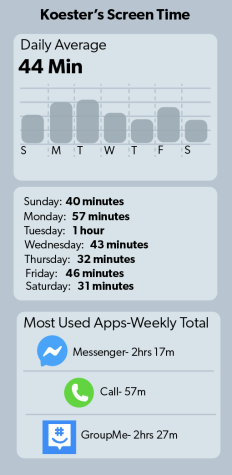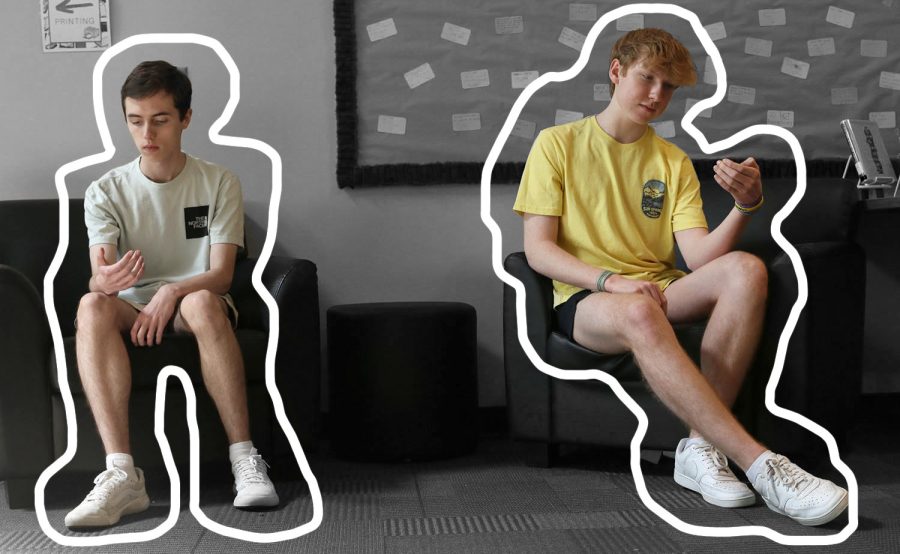Most teenagers cannot imagine their lives without a platform like Instagram, TikTok or Twitter. However, junior Nathan Anderson and sophomore Logan Koester live the uncommon reality of navigating adolescence with absolutely no social media.
Students avoid social media on the advice of their parents
April 18, 2023
For sophomore Logan Koester and junior Nathan Anderson, abstaining from social media altogether was not a personal choice, but rather something enforced by their parents.
Koester was unaware that he was becoming a slave to his Snapchat, Instagram and TikTok accounts when his family and friends first noticed a drastic change in his behavior six months ago. After his mom forced him to delete all of his social media from his phone, Koester agreed that he had become a different person.
“My relationship with technology was very toxic,” Koester said. “I always compared myself to others. I didn’t feel addicted but I always felt like I had to be on my phone and I always had to be checking up on social media and what other people were doing.”
Koester’s obsessive habit of checking his Instagram and TikTok feeds almost hourly made him miserable in his endeavor to meet unrealistic expectations.

“I was just so insecure all the time,” Koester said. “I was always observing people and comparing myself to them. Even in person, I would subconsciously pick out certain things I would want from certain people like, ‘I wish I had that nose. I wish I had that body, that face.’ It’s always been something that made me feel so bad and social media just made it worse.”
According to psychology teacher Kirsten Crandall, teens’ initial desire to be involved with social media stems from wanting approval.
“Teenagers are in a stage of their development where they are forming a sense of identity. ‘Who am I?’ ‘What do I stand for and represent?’ ‘What do people think of me?’,” Crandall said. “The primary source for answering these questions are their peers. The quickest access to feedback from your peers is social media. It’s a short cut for the strongest adolescent drive. Sometimes a beneficial one and sometimes a wildly destructive one.”
Just like Koester, junior Nathan Anderson is not allowed to have any social media per his parents’ rules. Anderson will be allowed to get social media if he chooses when he becomes an adult on his 18th birthday. Based on his own beliefs about social forums, Anderson agrees this is fair.
“I feel like if I was on social media, people would always be seeing what I was doing all the time,” Anderson said. “I really value my personal time and I don’t like the idea of putting all of my information out there. Also, partly, I’m worried about certain apps tracking my activity, but I’m not as worried about that as I used to be.”
Crandall explains that it is important for people to set and recognize their limits when it comes to social media..
“Social media has its benefits and can be a valuable tool. But, it is in no way on your side or looking out for you,” Crandall said. “It will take advantage of you, actively, if you don’t take back some agency and assert your control over it. You need to look out for yourself and put social media in its right place. You’re the only one who can.”
Koester wanted to solve his social addiction problem himself, but several long conversations with his mom helped him realize walking away was best.
“I was at a very low point, I was so upset,” Koester said. “I don’t know why I was so upset and I didn’t know why I was so depressed. My mom eventually said, ‘Logan, we have to stop this. You’re not the same person.’ At first, I was very against it. I thought, ‘I just need to get through this myself.’ But I finally realized deleting those apps altogether was the best thing I could’ve done.”
Since leaving TikTok, Instagram and Snapchat, Koester has no regrets.
“I am so much happier and focused on stuff that matters to me because I’m not constantly looking at other people who are ‘perfect’ and comparing myself,” Koester said. “I’m much more carefree. I don’t care about what others think of me as much anymore which has improved my mood and my relationships with my mom and friends.”
Anderson is content with currently being disconnected from the online world, but sees a possible future on social media as long as he is able to use it in moderation.
“I might get social media next year. I’ll be an adult and I feel like I’ll be able to communicate with my friends better through social media,” Anderson said. “As an adult, I should be more responsible and more mature to handle it and everything that comes with it.”
While he believes it’s a matter of everyone’s personal decision, Koester advises other students who are considering removing themselves from social media to consider how they would feel in its absence.
“It’s their choice, but I would say you’d feel so much better if you got rid of it,” Koester said. “If they are in the position that I was in, it will probably work for them because it worked so well for me.”
